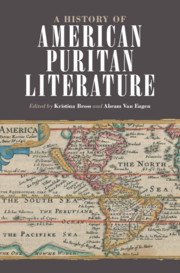13 results
Copyright page
-
- Book:
- A History of American Puritan Literature
- Published online:
- 24 September 2020
- Print publication:
- 15 October 2020, pp iv-iv
-
- Chapter
- Export citation
Figures
-
- Book:
- A History of American Puritan Literature
- Published online:
- 24 September 2020
- Print publication:
- 15 October 2020, pp ix-ix
-
- Chapter
- Export citation
Index
-
- Book:
- A History of American Puritan Literature
- Published online:
- 24 September 2020
- Print publication:
- 15 October 2020, pp 359-368
-
- Chapter
- Export citation
Appendix
-
- Book:
- A History of American Puritan Literature
- Published online:
- 24 September 2020
- Print publication:
- 15 October 2020, pp 353-358
-
- Chapter
- Export citation
Contents
-
- Book:
- A History of American Puritan Literature
- Published online:
- 24 September 2020
- Print publication:
- 15 October 2020, pp vii-viii
-
- Chapter
- Export citation
Introduction
-
-
- Book:
- A History of American Puritan Literature
- Published online:
- 24 September 2020
- Print publication:
- 15 October 2020, pp 1-16
-
- Chapter
- Export citation
Chapter 5 - Caribbean
- from Part I - Places
-
-
- Book:
- A History of American Puritan Literature
- Published online:
- 24 September 2020
- Print publication:
- 15 October 2020, pp 105-121
-
- Chapter
- Export citation
Part II - Approaches
-
- Book:
- A History of American Puritan Literature
- Published online:
- 24 September 2020
- Print publication:
- 15 October 2020, pp 143-341
-
- Chapter
- Export citation
Part I - Places
-
- Book:
- A History of American Puritan Literature
- Published online:
- 24 September 2020
- Print publication:
- 15 October 2020, pp 35-142
-
- Chapter
- Export citation
Contributors
-
- Book:
- A History of American Puritan Literature
- Published online:
- 24 September 2020
- Print publication:
- 15 October 2020, pp x-xiii
-
- Chapter
- Export citation
Acknowledgments
-
- Book:
- A History of American Puritan Literature
- Published online:
- 24 September 2020
- Print publication:
- 15 October 2020, pp xiv-xvi
-
- Chapter
- Export citation
Dedication
-
- Book:
- A History of American Puritan Literature
- Published online:
- 24 September 2020
- Print publication:
- 15 October 2020, pp v-vi
-
- Chapter
- Export citation

A History of American Puritan Literature
-
- Published online:
- 24 September 2020
- Print publication:
- 15 October 2020

